#a death in bloomsbury
Explore tagged Tumblr posts
Text
On the morning of March 28th, 1941, Virginia Woolf filled her pockets with heavy stones and walked into the River Ouse in Sussex.
#virginia woolf#leonard woolf#bloomsbury#bloomsbury group#modernist literature#literature#death of the author
6 notes
·
View notes
Text
Review: Sleep Like Death by Kalynn Bayron
Author: Kaylynn BayronPublisher: Bloomsbury YAReleased: June 25, 2024 Received: Own (OwlCrate)Find it on Goodreads | More Fantasy | Owlcrate Book Summary: Her whole life, Eve has believed that she’s destined to be the one to fight and destroy the Knight – the person plaguing her people for generations. She is unique because she has magic, but will it be enough to take on a supernatural being…
#Bloomsbury YA#Book#Book Box#Book Review#Books#Fantasy#Fantasy Novel#Fantasy review#Fiction#Kalynn Bayron#LGBTQ+#Literary#Literature#OwlCrate#Review#Sleep Like Death#Sleep Like Death by Kalynn Bayron#Snow White#snow white retelling
0 notes
Note
Everyone is sending GIF requests, so, here is mine. Hint: Jealous John? (Though I doubt this man can ever be jealous but...whatever comes to your genius brain)

Thanks!
@sweetwolfcupcake SWEEETS!!!!! I loved this prompt SO MUCH!!! You're such a genius. *kisses your head* I hope you like this! 💗💗💗
Bodyguard!John Wick x Shy!Curvy!Fem!Student!Reader
⚠warnings: threat of noncon (not John), mention of parental death
For the record, you didn’t mean to fall in love with John Wick. But he was nothing like the other goons your father had tasked with guarding you before. Wick was tall, and handsome, and had the soulful eyes of a poet. You know he’s dangerous; he can kill a man 30 ways with a pencil (the men of your father’s Bratva will not shut up about it) but he seems so…gentle. And the thing that really proved your undoing?
That good looking bastard was bookish, and it did something inconceivable to your lit major brain. Ever your dark shadow, you spent countless late nights in the library together, and so many Saturday afternoons browsing the used bookshops, combing for treasures. He would rescue the books that looked better fit for the waste bin, taking them to repair. Maybe he was there to protect you, for your father had many unsavory enemies, but it was easy to forget when John discussed with you the finer points of the Bloomsbury Set or the themes of Anna Karenina.
Maybe your father assigned John to you because he was one of the few gangsters around in his brigata one could trust to guard a relatively innocent young lady–that didn’t mean John was safe from you. You just couldn’t help yourself; you’d like to plead insanity, your honor, the night you finally broke and tried to kiss him, while he was helping you with your homework for Russian Lit 301.
How stupid you felt, how utterly pathetic, when he’d very kindly dislodged you from his so soft mouth, looking at you with pity in his sad dark eyes. “You know…we can’t do this,” he told you.
Mortified, you’d fled to your room and cried, knowing you are the most ridiculous human being on the face of the earth.
What were you thinking?
You are nothing like the tall, ethereal creatures that populate the clubs where Wick frequents with your father. You are shy, and curvy, and frankly…a nerd. An old soul, your father would say fondly, but you know he is just being kind.
You’re not sure how you got it into your head, that you were going to make Wick sorry. You’ve never been one for going out, but you decide to give it a whirl, wanting to be anyone but yourself. You decide to go to the Red Circle, to hang out with the other Bratva brats who care way more about clubbing and clothes and who’s fucking who, than classes at NYU.
At first you really hate it–but after a few shots of vodka, it’s not so bad. John has to hang back, keeping an eye on you but not interacting with your friends. He’s scary good at lurking in the shadows, but you know he’s keeping an eye on every move you make. Maybe that’s why you let Alexsei kiss you, the son of a semi-friendly loan shark who works in proximity with your father. You don’t really like him, if you’re being honest. But he’s not totally hideous–and he’s there–and John will have to watch it all.
You and Alex start to have a thing. It’s no big deal. Something to do, on the summer break from your studies. You invite him over to watch a movie, knowing you’ll have the house to yourself. Your father is always at his office doing business, your idiotic brother is always out getting into trouble with his khuligan friends, and your mother…is dead, God rest her poor soul.
You can tell Alex is a little drunk, when he shows up at your door. He’s very handsy, when you settle in on the couch to watch the latest mindless action flick, his pick. It’s ok, until he tries to unbutton your pants.
You have a secret.
You’re 21, nearly graduated from university–and you’re still a virgin.
This is not a thing you intend to give to Alexsei Plushenko. You don’t even really like the way he touches you.
“Stop, Alex.”
“Don’t be scared,” he tries to coax you. “This will be fun.”
“No,” you say. “Let’s just…”
He covers your mouth with his, shutting you up, his heavy body pinning you on the couch. “Don’t be such a stuck up bitch.” His groping fingers squeeze your breast clumsily, painfully, before fumbling with your jeans again. You try to push him off, but he’s heavy, and strong.
Suddenly, he is yanked from you like he weighs nothing at all. You hardly recognize what is happening at first, until you hear the sound of flesh striking flesh. John is on him, his iron fist meeting the younger man’s face.
“John! Stop!”
Wick looks up at you, meeting your eyes in a primal lock of stares–your heart drops and soars again, as you feel as though you’ve stumbled on a wolf over his kill, and the wildest thing?
You get the inkling that wolf is jealous.
“Don’t hurt him anymore,” you say, your voice barely above a whisper. A beating will make some complications for your father. A death? Could mean war.
Wick punches the handsy young man one more time, his eyes never leaving yours, before hauling Alex up by the collar and frog marching him out the front door, tossing him down the concrete steps of your home.
John finds you waiting for him in the marble foyer, his eyes wild, his knuckles torn. You don’t even know what to say.
“What did you even see in him?” he finally demands, clearly annoyed.
“He wasn’t you,” you answer without thinking.
Wick steps up to you, toe to toe, so that you have to crane your neck to meet his eyes. His hair has broken free from its slicked back style, tendrils in his eyes.
He’s never looked more beautiful, your savage savior.
“You’re trying to get me killed.”
You shake your head, the very thought anathema to you. You are transfixed, unable to look away, unable to think. “You’re too precious to me,” you admit, and screw your eyes shut the moment you admit it, a spear of mortification piercing you from your heart to your stupid, aching, cunt.
“Milaya…”
It’s the sweetest thing he’s ever said to you.
Your eyes drop to his knuckles, torn open in his defense of you. “You’re hurt.”
“It’s nothing.”
“Not to me.” You don’t know where you get the courage, to take his hand, and lead him up to your room. You can hardly believe it, that he actually follows you. In your ensuite bathroom you dab at his knuckles with a washcloth, slather him with ointment and plaster him with bandaids. You run out of sober flesh colored ones, so the last cut gets a Disney bandage, Ariel and sea-flowers decorating this severe man’s knuckles.
He lets you do all this, watching you intensely with those dark eyes you’re certain can see into your soul. You stand too close–and he lets you, this haunted man who watches over you day and night. Your whole life you have never wanted for anything, your father’s money buying you all your heart could possibly desire.
Until now.
You find it hard to meet his eyes, zeroing in on a spot of blood on his stark white dress shirt.
“Y/n.” With a gentle knuckle under your chin he turns your gaze up to his again. “You are too smart, and too beautiful, to be wasting your time with a fuckboy like Alexsei Plushenko.”
The first part you already knew. The second, from this man’s lips? Your knees nearly collapse out from under you, a flood of excitement and dread coursing through your system. You almost can’t stand it–it’s like being burned alive, and your native shyness rears with a vengeance.
You try to flee, back to the safety of your room, and your books, your imaginary lives that can’t really hurt you–but he catches your hand. His grip is not hard, but it is enough to stop you dead in your tracks.
“Y/n…” He’s pleading with you, but you don’t understand what he’s asking you.
“You said you don’t want me, John…” you say, still unable to meet his eyes. “So let me go.”
He answers by pulling you against him, the solid line of his torso a brick wall beneath the hand you raise to catch yourself. But bricks are not warm, like the flesh beneath his designer clothes. You can feel the wires in your brain sizzling, the synapses simply melting down. Your heart is Chernoble waiting to happen.
“I didn’t say that.”
“You said–”
“I said, ‘We can’t.’ Not, that ‘I don’t want you.’”
You almost cannot breathe, your heart attempting to beat out of your chest, a ringing in your ears that drowns out all else. There is nothing, nothing, in this world you’ve wanted more, than to hear those words from this man. But now that he’s standing before you, against you, holding you–you cannot move. You do not know what to do.
He solves this problem by cupping your cheek in his big hand–God, how you’ve noticed those hands–and then he is pressing his mouth to yours, gentle at first, but then…hungry. As though John Wick has been starving, for you, and it’s all you can do just to stand there and take it without melting into a puddle on the floor. His arms wrap around your back, holding you, lifting you to your tiptoes as he devours you. When at last he pulls back you are left seeing stars, struck utterly speechless with your hands on his broad shoulders.
“Tell me to stop,” he raggedly demands, his eyes boring down into yours.
Finally, you find your courage, meeting his stare. “I don’t want you to stop,” you whisper.
“Good. Because I don’t think I can.” He kisses you again, just as hungrily as the first time, his arm an iron band around your waist and his fingers sneaking up into your hair. That’s your kryptonite: your hair, and blithely you know he can do anything and everything he wants to you now.
Your father is a bad man, but you have not had a bad life. You have never known hunger, or true physical pain. He has protected you from the violence of his world. He has played things smart enough that not even the FBI can touch you, even though they absolutely know what he is and where your family gets its money. Despite all this, you have been dying inside, a slow, withering demise, until John Wick’s lips touched yours. He is the life-giving rain over the desert; your heart is a field of wildflowers erupting in a superbloom.
This time, he leads you, in between kissing you, to the loveseat at the foot of your bed. He sits, and only when he tries to pull you into his lap do you resist. “John…I’m too…much,” you insist, conscious of your generous flesh and what it would be like to set that on top of him, afraid he’ll be horrified.
However, he just scoffs at you, grabbing you up anyway and guiding you down. For a moment you are weightless–he knows how to upset a person’s balance, how to use their weight against them to put them on the floor. This time he uses it to put you on him. You’re not exactly proud of it, but the ease with which he utterly manhandles you makes your long-neglected lady parts sing with desire.
“You are perfect, dietka,” he insists, pulling you closer with hands on your round behind, “And I am very strong.” For the first time in you can’t remember how long–he smiles at you. That beautiful half smile with a sparkle in his dark eyes that takes your breath away–you love him so much it hurts.
This time you don’t feel so shy, about kissing him. You feel like your bones are filled with butterflies, and you both moan and giggle as you do your best to devour each other from the mouth down. Aside from an appreciative squeeze of your thighs bracketing his hips, he doesn’t try to seduce you, even though you know you absolutely would have given him anything he asked you for. He is content, just to kiss you, for this night at least, and oh. He’s good at it too.
You decide you would burn down the world, for one more kiss from John Wick.
Later you find yourself snuggled in your bed with John, fully clothed, your head on his shoulder as he toys with the fine hairs at the back of your neck. His touch is heaven, and with your legs twined with his it’s hard not to squirm and writhe against his muscled thigh like a horny little gremlin.
Later, you tell yourself. It can wait for later.
Like maybe, tomorrow.
“We’ll have to be careful,” he warns you. “If your father…”
If your father found out, the best thing that could happen to John is getting fired.
“I won’t let you get hurt,” you promise, kissing his bearded cheek, praying you’re telling the truth.
He chuckles at this; a deep sound you feel more than hear. “I thought that was my job?”
“You know what I mean.”
“I know.” He looks down at you with a tenderness that curls your toes. “It would be worth it, for you.”
Your heart has suddenly decided it would like to take up residence in your throat–permanently.
“Oh, John…”
He kisses you again, a soft brush of lips that renders you weightless. This is how you die: it’s almost too much to stand, this impossibly full feeling in your chest. Then he narrows his eyes at you playfully. “You have been driving me mad, you little minx. I wanted to kill everyone who so much as looked at you in the Circle.”
You snort at the thought–you do not understand, really, that he could absolutely do it too.
“Not to worry. I think the library is more my speed.” He rests his head against yours with a small, contented sigh. “Mine too,” he admits. The smell of old books around you is a soothing balm to you both.
You know small bits of his past. Morsels he has sprinkled, here and there in the conversations you have had. You know he did not have an easy childhood. You know that this life was not really his choice. Even less so than most, who move and work in the Underworld.
“If you could live anywhere in the world, where would it be?” you ask.
He lifts an eyebrow at you. “I’m liking New York, at the moment,” he tells you with an affectionate squeeze.
“Oh come on.”
“Fine. I like Paris a lot.”
“Hmm,” you answer, but what you think, is: Done. You will have the opportunity to arrange to study abroad soon, and you think a trip away from the Tarasov territory might do you both some good.
Surely Papachka wouldn’t deprive you of your most trusted bodyguard?
698 notes
·
View notes
Text
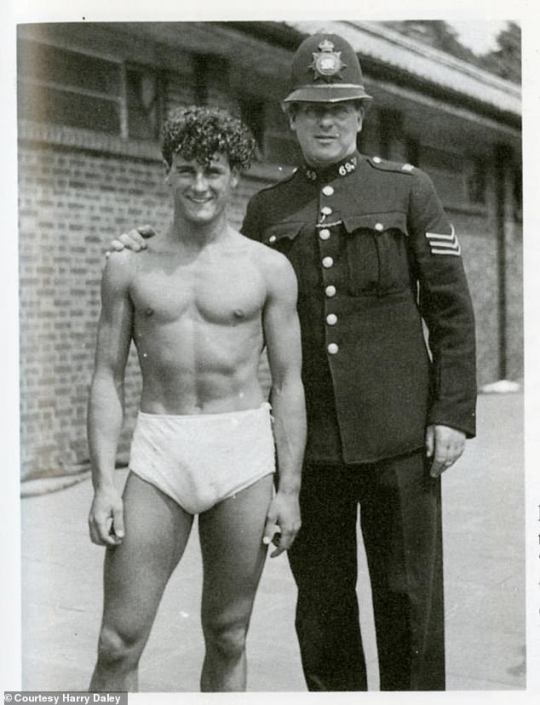
Officer Harry Daley and friend pose at a London swimming pool. (c.1930's) Harry Daley joined the London Metropolitan Police in 1925 and was the first openly Gay person to serve. Besides being a policeman, he dated E.M. Forster and partied with the Bloomsbury Group. His portrait was painted by Duncan Grant. His memoirs were published in 1987, 16 years after his death in 1971.
409 notes
·
View notes
Text
Elain used Truth-Teller to kill the nameless King of Hybern
Disclaimer: as usual, these are just my thoughts, they make no claim of being canon. I also want to reiterate that saying Nesta (and Cassian) "helped" to kill the king in no way diminishes their self sacrificing bravery. This isn't a diss.
Spoilers: ACOTAR, CC and TOG series to date.
TW: canon violence.
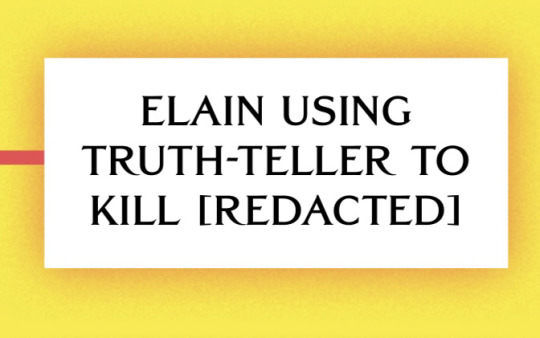
This post shouldn't need to exist but, just like when Bloomsbury confirmed that Elain tended towards introversion in their post ACOSF Archeron sister quiz, parts of this fandom are struggling to listen to the series' publisher when they say that Elain did, in fact, kill the king of Hybern.
To clarify, I've always maintained that Elain wouldn't have been able to assassinate Hybern if Nesta and Cassian hadn't completely distracted him - they were brave and self sacrificing, and they 1000% helped the kill happen! - but without Elain, and whatever it was that she did to get from their war camp to the middle of the battlefield in time to "step out of a shadow" and stab the OT's Big Bad through the neck, Nesta and Cassian would be dead. Feyre and Rhys would be dead. The rest of the High Lords gone as well, and their world changed for good. And as @merymoonbeam (I think) said years ago now, without Elain killing Hybern, Rhys wouldn't have been alive to assist Aelin in returning to Erilea in KOA, so her actions saved more than one world as we know it.
Now, for the scene in question:
Nesta did not move from where she shielded Cassian’s body. The king raised his hand, power whirling like a dark galaxy in his palm. I knew they’d both die the moment that power hit them. Anything, I begged the Cauldron. Anything— The king’s hand began to drop. And then halted. A choking noise came out of him. For a moment, I thought the Cauldron had answered my pleas. But as a black blade broke through the king’s throat, spraying blood, I realized someone else had. Elain stepped out of a shadow behind him, and rammed Truth-Teller to the hilt through the back of the king’s neck as she snarled in his ear, “Don’t you touch my sister.” - ACOWAR, chapter 74
The Cauldron purred in Elain’s presence as the King of Hybern slumped to his knees, clawing at the knife jutting through his throat. Elain backed away a step. Choking, blood dribbling from his lips, the king gaped at Nesta. My sister lunged to her feet. Not to go to Elain. But to the king. Nesta wrapped her hand around Truth-Teller’s obsidian hilt. And slowly, as if savoring every bit of effort it took … Nesta began to twist the blade. Not a rotation of the blade itself—but a rotation into his neck. Elain rushed to Cassian, but the warrior was panting—smiling grimly and panting—as Nesta twisted and twisted the blade into the king’s neck. Severing flesh and bone and tendon. Nesta looked down at the king before she made the final pass, his hands still trying to rise, to claw the blade free. And in Nesta’s eyes … it was the same look, the same gleam that she’d had that day in Hybern. When she pointed her finger at him in a death-promise. She smiled a little—as if she remembered, too. And then she pushed the blade, like a worker heaving the spoke of a mighty, grinding wheel. The king’s eyes flared—then his head tumbled off his shoulders. - ACOWAR, chapter 75
Isn't it interesting that the Hebrew meaning of Elain's name is "my god has answered me," when she was able to answer Feyre's pleas to the Cauldron? I think so.
Didn't Nesta decapitate the king?
Sure, nobody I know disputes that! I don't think it could have been done even before Azriel very specifically said that Nesta had done so (but no more), when they told Bryce about the king's death when she visited in HOFAS. But - to me - it is absolutely crystal clear from the above passage that if anyone did the leg work, it was Elain. If anyone's timing had to be precise, it was Elain. If anyone fucked up and didn't play their part to perfection, it was Elain's role that was most critical. Nesta was bait (which she did very well!), but Elain was the trap that sprang from the shadows, dagger flashing.
Elain was the Knife in the Dark. She set up a slow death for the King of Hybern, which was very Anneith of her, by the way; Nesta just sped it up.
But the king would have recovered!
The wound to Hybern's neck was not a light - or even moderate - gash.
It was a full depth stabbing from a brutal hunting knife, so deep there was an exit wound out the other side. He had fallen to his knees, he was choking on his own blood, he was down. Thanks to Elain. Given the location of the wound, and the implicit reference to a severed carotid artery in the text (the spraying blood), there is also the possibility of neurological damage to the king's spinal cord, up to and including internal decapitation (though, as he appeared to retain the use of his arms til the very end, even when his head was literally hanging on by a thread, I'm not sure how much thought SJM gave the science beyond "blood spraying, choking, collapsing = obviously catastrophic vascular wound, and fair enough, really - who thought we'd be here after Feyre, Lucien and Rhys all credited Elain before ACOSF came along and we heard the story from people who didn't get it directly from the source).
But even with the (I thought) violent severity of the king's injuries after Elain had "just stabbed him," people have decided that the king would simply have recovered.
Yes, the King of Hybern was an incredibly powerful faerie - some might say too powerful - but we knew from the start that Truth-Teller was special (I had wondered for years if it was secretly a Made blade before we finally got confirmation through CC, and I know I'm not the only one); Azriel himself told Elain that it would "always strike true," and Feyre (read: SJM) described it as "devouring" the sunlight when Elain accepted it from Azriel. And who has consistently been likened to the sun? Elain. Does it not seem reasonable, then, to suggest that Truth-Teller - which has since helped Bryce kill Vesperus, an Asteri/Daglan held in the bowels of the Prison, not to mention Rigelus and his crew - may have some additional bonus to its wounds, such that they are harder to recover from, or even impossible? Why are people acting like Elain simply stabbed him with a steak knife, ignoring the parallel between Nessian and Elriel? She clearly upgraded from the fork she armed herself with in ACOMAF.
I could obviously be wrong, but I truly don't think that SJM intended for us to think that the King of Hybern would have simply recovered from Elain's stab wound without input from a powerful healer at minimum. Azriel's Truth-Teller is no ordinary blade, and Elain (and Nesta, of course) is no ordinary faerie - a little more on this in a bit.
Back to Bloomsbury's ACOTAR bracket:
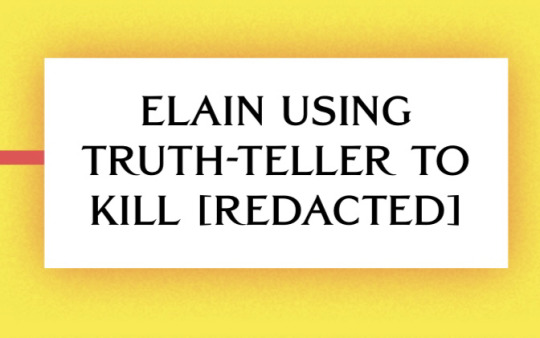
"Redacted."
Sounds familiar, no?
Of course, given Feyre, Rhys and Lucien¹ have all named Elain as the one who killed the King of Hybern, not to mention Azriel very specifically telling Bryce that Nesta "beheaded" him - after all, why not say "killed" if that's what he means? - it's mind blowing that this is a debate only because Nesta herself claimed the kill (in a scene that read a little odd, but I digress).
¹ Yes, I know that Elain credited Nesta with the kill, but there are any number of reasons as to why she may have done so that do not negate the majority effort that she put into killing the King of Hybern. For starters, Elain doesn't trust Lucien at this point (yet, I'm sure they'll talk in her book and come to some sort of understanding, whatever it may be in the end); having just experienced a violent, bloody battle, she may not feel ready to claim the action herself (which, again, doesn't mean that Nesta did more than she actually did); and - possibly the biggest reason - would be that Elain holds a very specific arsenal of skills, one about which we still don't have the complete picture, so it would be prudent to keep the extent of her involvements and skills to herself (from Lucien here, from Emerie and Gwyn in ACOSF, and from Bryce in HOFAS). Or, as I've discussed before, Elain - as a Made being who holds this ability - may be "redacting" herself from history for one reason or another. In short, I am a "luck and rage = Elain" truther til proven wrong by SJM lol.
Elain fell into step beside me, peering at Lucien. He noticed it. “I heard you made the killing blow,” he said. Elain studied the trees ahead. “Nesta did. I just stabbed him.” - ACOWAR, chapter 78
I saw how it ate away at Feyre. I still soothed her after she awoke, frantic, from nightmares about that day in Hybern when her sisters had been Made against their will. Nightmares about the moment when Cassian was near death and Nesta was sprawled over him, shielding him from that killing blow, and Elain—Elain—had taken up Azriel’s dagger and killed the King of Hybern instead. - ACOFAS, chapter 2
I've already talked about the following quote in a couple of posts (here and here), where I suggest that Elain not only killed the man, but purified² the monster inhabiting him as well. The parallels between Elain's likely life (or rebirth?) powers from the Cauldron - the Bowl of Life and Death - with Yrene's pure, healing life (which Erawan described as an executioner to a Valg), not to mention Truth-Teller appearing to charge itself with sunlight before Elain used it to stab the king... there's a lot there that, when considered together, is incredibly suss.
² I've spoken about this with @wingedblooms before, but what if Elain killed the monster within, and Nesta made it impossible for the king's corpse to reanimate by beheading him? I suspect there is a reason that "Life and Death" were involved here, especially as "The Bowl" watched on, but again, this doesn't negate the majority share of effort/skill that Elain used to orchestrate and carry out the king's death.
Yrene’s power was life itself. Pure, undiluted life. It nearly brought Dorian to his knees as it met with his own. As he handed over his power to her, willingly and gladly, Erawan prostrate before them. Impaled. The demon king screamed. - KOA, chapter 113
The use of "redacted" by Bloomsbury, however, seemed so intentional - I know @psychologynerd, @elrieldreamer and others have also discussed it (here and here) - that it stood out to me as odd, and reminded me of the rest of that scene from KOA (below), when Dorian and Yrene together killed Erawan (a Valg king).
The King of Hybern was never given a name like any of Prythian's rulers (the High Lords), despite his importance to the plot. I know I'm not the first to suggest that this was significant - and now I'm wondering about the Lady of Autumn possibly paralleling Sartaq's sister Duva, I'm sorry 😩 - but for ages it has struck me as interesting that his namelessness parallels another king from elsewhere in the Maasverse: the King of Adarlan.
The king who was possessed by a Valg for much of his life, who only remembered his name when he passed it onto his son as an act of defiance. Knowing this last, could the Lady of Autumn's redacted name be "Lucia"?
Erawan thrashed, his power rising only to strike against an impenetrable wall of light. And yet Dorian found himself saying, “His name.” Yrene, focused upon the task before her, didn’t so much as glance his way. But Erawan, through his screaming, met Dorian’s stare. The hatred in the demon king’s eyes was enough to devour the world. But Dorian said, “My father’s name.” His voice did not waver. “You took it.” He hadn’t realized that he wanted it. Needed it, so badly. A pathetic, spineless man, Erawan seethed. As you are— “Tell me his name. Give it back.” Erawan laughed through his screaming. No. “Give it back.” Yrene looked to him now, doubt in her eyes. Her magic paused—just for a heartbeat. Erawan leapt, his power erupting. Dorian blasted it back, and lunged for the demon king. For Damaris. Erawan’s shriek threatened to crack the castle stones as Dorian shoved the blade deeper. Twisted it. Sent their power funneling down through it. “Tell me his name,” he panted through his teeth. Yrene, clinging to his other hand, murmured her warning. Dorian barely heard it. Erawan only laughed again, choking as their power seared him. “Does it matter?” Yrene asked softly. Yes. He didn’t know why, but it did. His father had been wiped from the Afterworld, from every realm of existence, but he could still have his name given back to him. If only to repay the debt. If only so Dorian might grant the man some shred of peace. Erawan’s power surged for them again. Dorian and Yrene shoved it back. Now. It had to be now. “Tell me his name,” Dorian snarled. Erawan smiled up at him. No. “Dorian,” Yrene warned. Sweat slid down her face. She couldn’t hold him for much longer. And to risk her— Dorian sent their power rippling down the blade. Damaris’s hilt glowed. “Tell me—” It is your own. Erawan’s eyes widened as the words came out of him. As Damaris drew it from him. But Dorian did not marvel at the sword’s power. His father’s name … Dorian. I took his name, Erawan spat, writhing as the words flowed from his tongue under Damaris’s power. I wiped it away from existence. Yet he only remembered it once. Only once. The first time he beheld you. Tears slid down Dorian’s face at that unbearable truth. - KOA, chapter 113
As I have previously stated (here and here), and reiterated above, I think there is plenty of evidence to suggest that Elain is the true - or main - Kingslayer in the sense of who did the most to ensure the king's death, but I also think that the King of Hybern may have been possessed by Something/Someone; could this be another hint? That the kings of Hybern and Adarlan both had names that were, hypothetically for one of them and canonically for the other, redacted from their respective worlds by parasitic creatures with delusions of grandeur who had taken their bodies as hosts? Is this further evidence that Elain killed the hypothetical Valg prince infecting the King of Hybern, while simultaneously taking down the unfortunate host?
Once again, SJM - we need answers!
Thank you so much for reading!
#elain archeron#pro elain archeron#elain's powers#acotar theory#elain kingslayer#pro elain#truth teller#truth teller theory#acotar cc tog crossover theory#maasverse#if there are any glaring errors in this i'm sorry#i'm so sleep deprived right now#hopefully it's okay#the knife in the dark
100 notes
·
View notes
Text
Upon seeing a slew of Anons sent to Elriels about the same thing, I think that this is worth mentioning.
What our esteemed Gwynriel colleagues catastrophically fail to understand (among many other things, but that's a different discussion) is that in saying that only ACOSF matters, and that the original trilogy and ACOFAS don't matter, they again, demonstrate their utter inability to see anything beyond just their small crackship.
See this?

A
Court
Of
Thorns
and
Roses
The famous red book. The book that started it all.
Notice how they are NOT advertising A Court of Silver Flames.
You see, Sarah J Maas and Bloomsbury Publishing want to SELL books. They want books to be very much connected to each other, so you actually CAN'T just buy one book and nothing else. So much so, that now, we have a crossover! with a whole other SERIES. Which means that ideally, we as readers will buy not only ACOTAR but CC.
And eventually there will be a crossover with TOG, which will necessitate the buying of that humongous series as well.
See, this is how authors and publishers make....MONEY. The reason why serial writing is so popular is because you made readers buy books, and once a new reader starts to read your series, they'll buy all the previous books. It's also much easier to sell the rights to a series to a movie studio than just one book.
The reason the big red ACOTAR book is displayed everywhere is because BB wants people to read ALL the books. So then when the new book is announced, it will force all the newcomers--and there are literally millions of them--to go and buy the series.
ACOSF is one $8 book. (I just looked it up on Amazon. A paperback is 8.21) The whole set (paperback) is $39 (more than quadruple the price of ACOSF) and hardback set is $75.
So in what world would BB want to center their next blockbuster release which has been anticipated for (by the time it's released) 5 years on......Gwyn Berdara, a friend to Nesta? Gwyn, who's been in ONE book. Here, Gwynriels ARE correct. You wouldn't need to read the trilogy to understand the unremarkable character that's Gwyn, who's done very few things of note other than you know...cutting a ribbon.
If people genuinely think that SJM and BB would toss away literally millions, maybe hundreds of millions in profit, by centering the book on Gwyn, who has no connection to the OG Trilogy, who holds no interest to 99% of readers and who isn't connected to any plots within the series (the plots that TikTokers made up for clicks and engagement don't count!) then it is honestly tragic.
Money talks. And Gwyn isn't a moneymaker. Sorry.
Also, I would recommend reading up about publishing, marketing and general economics.
This is why the next book is going to be about the two most mysterious characters in the series--Elain Archeron and Azriel. This is why the next book will be about a heart wrenching love triangle, where love will trump a mate bond. This is why the next book will be about the most mysterious lost Court in Prythian. The most mysterious Death God. And probably, a crossover with Erilea.
96 notes
·
View notes
Text

"&" Ampersand - A Literary Companion
Selected stories with the themes of Bastille's upcoming project "&" Ampersand. And, of course, a love letter to my favourite band.
PART 1
Intros & Narrators: Wallace, David Foster. Oblivion: Stories. Little, Brown and Company, 2004./ Nancherla, Aparna. Unreliable Narrator: Me, Myself, and Impostor Syndrome. Penguin Publishing Group, 2023.// Eve & Paradise Lost: Bohannon, Cat. Eve: How the Female Body Drove 200 Million Years of Human Evolution. Knopf Doubleday Publishing Group, 2023. / Milton, John. Paradise Lost. Alma Classics, 2019.// Emily & Her Penthouse In The Sky: Dickinson, Emily. Emily Dickinson’s Poems: As She Preserved Them. Harvard University Press, 2016. /Dickinson, Emily. Emily Dickinson: Letters. Edited by Emily Fragos, Knopf Doubleday Publishing Group, 2011.// Blue Sky & The Painter: Prideaux, Sue. Edvard Munch: Behind the Scream. Yale University Press, 2019. / Knausgaard, Karl Ove. So Much Longing in So Little Space: The Art of Edvard Munch. Random House, 2019.//
PART 2
Leonard & Marianne: Hesthamar, Kari. So Long, Marianne: A Love Story - Includes Rare Material by Leonard Cohen. Ecw Press, 2014./ Cohen, Leonard. Book of Longing. Penguin Books Limited, 2007.// Marie & Polonium: Curie, Eve. Madame Curie. Knopf Doubleday Publishing Group, 2013./Sobel, Dava. The Elements of Marie Curie: How the Glow of Radium Lit a Path for Women in Science. Atlantic Monthly Press, 2024.// Red Wine & Wilde: Wilde, Oscar, et al. De Profundis. Harry N. Abrams, 1998./ Sturgis, Matthew. Oscar: A Life. Head of Zeus, 2018.// Seasons & Narcissus: Ovid. Metamorphoses: A New Verse Translation. Penguin, 2004./ Morales, Helen. Antigone Rising: The Subversive Power of the Ancient Myths. PublicAffairs, 2020.//
PART 3
Drawbridge & The Baroness: Rothschild, Hannah. The Baroness: The Search for Nica, the Rebellious Rothschild. Knopf Doubleday Publishing Group, 2013./ Katz, Judy H. White Awareness: Handbook for Anti-racism Training. University of Oklahoma Press, 1978.// The Soprano & Her Midnight Wonderings: Ardoin, John, and Gerald Fitzgerald. Callas: The Art and the Life. Holt, Rinehart and Winston, 1974./ Abramovic, Marina. 7 Deaths of Maria Callas. Damiani, 2020.// Essie & Paul: Ransby, Barbara. Eslanda: The Large and Unconventional Life of Mrs. Paul Robeson. Haymarket Books, 2022./ Robeson, Paul. Here I Stand. Beacon Press, 1998.//
PART 4
Mademoiselle & The Nunnery Blaze: Gautier, Theophile. Mademoiselle de Maupin. Penguin Classics, n.d./ Gardiner, Kelly. Goddess. HarperCollins, 2014.// Zheng Yi Sao & Questions For Her: Chang-Eppig, Rita. Deep as the Sky, Red as the Sea. Bloomsbury Publishing, 2023./ Borges, Jorge Luis. A Universal History of Infamy. Penguin Books, 1975. // Telegraph Road 1977 & 2024: Kaufman, Bob. Golden Sardine. City Lights Books, 1976./ Wolfe, Tom. The Electric Kool-Aid Acid Test. Pan Macmillan Australia Pty, Limited, 2008.
Original artwork created by Theo Hersey & Dan Smith. Printed letterpress at The Typography Workshop, South London.
186 notes
·
View notes
Text
RICKMAS 2024 - DAY 2 - SECRET WATCHING

Pairing : Judge Turpin x OC
Summary : 5 years. 5 years that The Death's Judge had noticed you. 5 years he was watcing you in silence. But now, it's time to speak out if he doesn't want to lose you... for ever.
Tag(s)/Warning(s) : Angst. Violence towards a woman. Manipulation. Deceptiveness.
A/N : I didn't proofread, therefore let me know (or not) if there are any too obvious mistakes.
Also read on AO3 - Wattpad


It had been a long time since he had noticed you. 5 years, 8 months, 23 days and 6 hours to be exact.
Lord Richard Turpin, High Judge of London, The Death's Judge, was a man of precision, even more so when it came to you.
It was a cold and foggy evening in November that he had noticed you. You were walking down Fleet Street, your bun letting loose little unruly hairs that flew in the wind and in your hands, you held books. On your back, you had a coat much too thin for the harsh winter that was coming.
Who were you ?
This question haunted him the second you raised your big green eyes to him without seeing him.
That evening, he had followed you under the pretext that nothing happened to you. After all, the streets of London can be dangerous, especially in the middle of the night, when they are lit only by the weak lanterns that adorn the sidewalks of the City without really illuminating it.
A creature as beautiful as you... what an unconscious judge he would have been not to stay hidden in the shadows to watch over you... and find out where you lived.
You entered a small modest house in a poor neighborhood of Bloomsbury, in a small shop where the sign read [[Y/S] - Watchmaker].
Now that he knew your address and your supposed last name, he rushed to his gloomy mansion without wasting a second. In the comfort of his leather armchair, far from the slums of London, he waited for his faithful and deceitful secretary while watching the wood fire crackling in the fireplace of his office. He found himself wondering if you were shivering with cold in your small house that must have let the wind through every window. If that was the case, he wanted to be the one to warm you up... even if he had to learn that you were married.
"BEADLE !" he had shouted, putting down the book that he wasn't even trying to call a book.
"My lord ?" The Beadle had asked in his honeyed voice, appearing out of nowhere, like a rat waiting for a good reason to come out of its hole.
"Find me everything you can about a young woman. Her name is [Y/S]. She lives in the deprived area along Goodge Street."
It didn't take much for The Beadle to come back in just a few days with everything Richard was burning to know.
Your full name was [Y/N] [Y/S]. The watchmaker's shop you had entered belonged to your father, but it barely allowed you to live decently. You weren't married and no fiancé was in sight. This last piece of information had strangely relieved Richard.
You were a little schoolteacher with no real official qualification except for a certificate with no real value, but the little informal girls' school you worked for didn't care about your qualifications. You knew how to read, write and count to teach these poor little girls to do the same in addition to learning sewing, embroidery and all those domestic tasks that would become theirs.
Richard deduced that you had to work hard for a salary that must have been very meager, but according to The Beadle, that didn't stop you from doing your job well. Your students liked you, especially since you were the only teacher who didn't beat them with that long wooden stick that bruised the hands of the other little girls in the school and the parents had no complaints about you.
And after that, he had continued to observe you. For a long time. Without ever trying to approach you, but not without acting. Indeed, strangely enough, your father had found himself counting lords and important men among his clientele. Your school had received new notebooks and the stoves that heated the classrooms had never run out of coal in 5 years.
And yet, he had never tried to speak to you. Certainly not because he was too embarrassed by your 20-year age gap or your differences in social class. No, it was much darker than that. You exuded innocence, purity and Richard, in his depraved nature, wanted to take all that away from you. He knew that the moment he allowed himself to be close to you, that he would say hello and let you know that he had noticed you, he would ruin all that pure beauty that was in you. Because he wanted you and what he wanted to do to you would have made God himself blush.
5 years he had been watching you, his heart singing for you every time he saw you while you were in total ignorance. How could you have suspected for a single second that you had made the terrible Lord Turpin fall in love ?
Oh, you knew his name, he was certain of it. Everyone in London knew the terrible Richard Turpin, The Death's Judge. But no one could have imagined that a man like him could have let such a pretty little thing as you creep into his mind so much that it was your face that he saw when he was fucking the whores of Whitechapel.
In five years, he had never seen you with any friend. Sometimes your father accompanied you on your walks, but most of the time, you were alone. Always impeccable, despite the modesty of your outfits, always friendly and smiling, there was nevertheless no one around you.
Until last week. For the first time, Richard felt his heart pinch, almost break, at the sight of a young man who walked beside you, a stupid smile on his face. He was clean on him, of a higher class than yours, but certainly not higher than Richard's.
Jealousy completely consumed Richard in the face of this sight.
It hadn't taken more than half a day for Richard to have a detailed report on this young man who answered to the name of Robert Crawford. He had hoped to find something, anything, to send this impertinent little boy who had set his sights on you to the depths of a colony in Australia. But nothing. He had found nothing and neither had The Beadle and it made Richard sick.
He could not bear that you had finally found the one who was going to take you away from your father and take your purity, especially this purity.
Robert came from a family of rich merchants and he himself was a fierce and renowned trader. However, there was something about this Robert that Richard did not like. He could not say what, but there was something disturbing about this young man.
Perhaps it was this reserve that you always seemed to have around him. You only half smiled and in truth, you did not really seem in love with him. But it was not surprising. Few women had the luxury of dreaming of love, even less when, like you, they had no money. Marriage was not a matter of the heart but of pragmatism.
On the contrary, Robert never failed to smile in your presence, but it seemed false to Richard. This man was hiding something, he was certain of it, his cold, calculating and manipulative nature had never deceived him and he promised himself to keep an eye on this young man.
For the first time, he had hesitated to come and talk to you. He could have easily torn you away from this boy, but it would have been so hypocritical of him. It was surely not better, he who had often wondered what he would feel if he took you on his desk in court between two trials.
Months passed and this young man became more and more present in your life, until Richard saw a ring with a tiny diamond adorning your finger. And yet, you still did not seem happy. There was no excitement in your eyes, only resignation.
And once again, he did nothing, waiting to see the banns announce your marriage and when they finally came out, he felt his world collapse, his certainties fly away, his heart break for good, he who had always thought he was made of nothing but ice. In two months, you would become Mrs. Crawford.
It was three weeks before your wedding that something changed. You were crossing the street when Richard saw you, but what he noticed most was the bruise on your cheek. Black. Painful. And finally, he understood why this Robert was bothering him so much, why his instinct was screaming at him to send this man to the end of the world or to the end of a rope.
Taken by an impulse, Richard crossed the street to find himself in your path and gently jostled you, as if nothing had happened, making the books you were holding in your trembling hands fall.
"Forgive me, miss, I was distracted," Richard lied.
"It's nothing," you replied as you bent down, not even daring to look up at him.
He bent down to help you, holding out a hand to help you up while his other hand held two of your books. You finally looked up at his, your big green eyes widening in surprise when you recognized the man who had just helped you.
"Lord Turpin," you said in a breath.
"So you know who I am," Turpin said softly with a sad smile.
He was not fooled, if you knew his name, it was because of his terrible reputation and nothing was made up. What earned him the nickname The Death's Judge came from his ruthless judgments, his austere nature and his ability to manipulate the course of events to his will.
"Your cheek," he said softly, unable to take his eyes off the dark stain, that even though didn't spoil your beauty.
"I fell against a piece of furniture," you whispered, looking away.
Liar, Richard thought. You had been slapped. Hard. Probably hard enough to make you fall. But that mark on your face was a mark made by a hand. The hand of a man. Certainly the hand of the man who would soon swear to love and protect you.
A shiver ran down Richard's spine thinking about it. You were going to marry a man who was going to make your life hell, who would beat you every chance he got and who would make a shadow of you. In three weeks, you would no longer be allowed to teach. You would be a prisoner in your own house and corrected for every sideways glance. He would teach you not to think for yourself anymore, because every time you tried to contradict him, he would remind you of your place with a good slap... or worse.
"A very brutal piece of furniture," Richard said coldly.
"Yes, indeed," you answered in a whisper.
"Can I walk you home, miss..." he asked, pretending not to know your name.
"[Y/N], my name is [Y/N] [Y/S]."
"A very pretty name, Miss [Y/S]," he said before asking you again if he could walk beside you.
"I don't think that's a good idea."
Richard hadn't missed the glint of panic that had crossed your eyes. The hold had already begun. You couldn't even talk to a man without fear of being punished. He wondered if your father knew or if you had told him the story of the furniture and he had believed it.
"In that case, be careful. The streets of London can be dangerous in the dark for a woman," he said without taking his piercing gaze away from your small, frail figure.
"Closed doors are even more dangerous," you replied in spite of yourself before greeting him respectfully and leaving.
Indeed, closed doors could be dangerous, but enough of watching you in secret. Richard knew. Richard was going to act. This marriage would not take place, he promised himself that.
The Beadle was tasked with finding something, anything that could legally indict this young man from a good family. Richard had to play it smart, he wasn't going after some scumbag from the London slums. The Crawford family, though untitled, had some good allies thanks to their money.
But when, three days later, he saw you with a split lip and a new bruise near your nose, a dull anger filled him, and nothing was going to stop him from getting rid of this Robert.
"Miss [Y/S]," you heard behind you.
You turned around with a start before raising an eyebrow in surprise when you recognized Lord Turpin.
"Your furniture seems to particularly hold a grudge against you," Richard said immediately without giving you time to greet him formally.
"I..."
"No lies, miss. I am the High Judge of London, I punish lies," he interrupted you.
You looked down, not knowing what to say.
"Is it the action of your fiancé ?"
You looked up at him questioningly before looking away again, unable to meet his piercing gaze.
"Miss [Y/S], are you in danger ?"
"I don't know," you answered in a breath, tears in your eyes.
Richard grabbed your arm roughly and dragged you inside the courthouse to his office. You didn't even have the strength to protest, too surprised by his actions, also afraid that someone in the street had seen you and would report it to Robert. That you had let another man touch you would earn you a new punishment, you knew that.
"Sit down," Turpin ordered you, closing the heavy wooden door of his office behind you.
You obeyed without daring to look at him, wondering what he was going to do. You had nothing to reproach yourself for, but you were not afraid that he would imprison you. Your recent experiences had taught you that there were many other things you had to fear from a man.
"When did it start ?" Richard asked, coming to sit in front of you.
"Why do you care ?" you asked, raising your chin a little.
Richard smiled imperceptibly. You were certainly not broken. You still had the strength to rebel, your flame was not extinguished, this man had not yet completely subjugated you by making terror your worst enemy.
"Miss [Y/S], it is my duty to worry about the citizens of London."
You finally looked him in the eye, a small ironic smile on your lips that Richard didn't miss.
"I can protect you, Miss [Y/S]. But you have to tell me the truth for that."
You hesitated. Even though he was the highest authority in the court, you weren't sure that a man like him could be trusted. Not without having to pay the price. But at this point, it was after all, choosing between the plague or cholera.
"I..." you began, hesitant, not knowing what to say.
"Is he your fiancé ?" Richard asked again.
"Yes," you finally answered.
"When ?"
You shook your head, hoping to stop the tears that had just welled up in your beautiful, bruised eyes from flowing.
"A little after the marriage proposal. He..."
The tears began to flow in spite of yourself. Richard handed you his handkerchief embroidered with his initials. You took it, trembling, and you finally tell everything.
You had met Robert by chance in your father's shop and he had courted you almost immediately. You weren't really interested in this young man, but he was kind, well-mannered, and above all he had money. It was this last criterion that had pushed your father to encourage you to frequent him. Your father was not unaware that when he died, you would inherit nothing and he could not bear the idea of you ending up on the street. It was not your meager income as a schoolteacher that could have supported you.
At first, Robert was only kind. He covered you with gifts, his parents seemed happy to welcome you into the family, and you had ended up telling yourself that with time, you could learn to love him. But after the marriage proposal, he had changed. It had first been a slap in the face because you had reprimanded him for a simple language error. Then another, and another, until he promised to "re-educate" you once you were married. As if to prove his point, he had hit you with the hand that held your family's signet ring, splitting your lip. Each time, it was for stupid reasons. Because you were too smart, because you were too intelligent, because you had said no.
"And your father, does he know?"
"No !" you cried, "he must not know. He would kill Lord Turpin and I do not want my father to be hanged," you said quickly.
Richard clenched his fists. He too wanted to kill him, this Robert who thought he could beat you for his own pleasure.
"And he believes your stories about falling on a piece of furniture ?" Richard asked coldly.
"I don't think so," you murmured, "but I don't want my father to get into trouble."
Richard's features softened slightly. Of course, as a good, loving daughter, you didn't want your father to have blood on his hands because of you. But you were the one who would end up dead if this match went through.
"Do you really have to marry him ?"
"I said yes, the banns have been published," you answered as if it were obvious.
"You could go away, hide yourself," Richard suggested.
"But where would I go ? I only have my father and he's too old to start a new life anywhere else. All he has is here in London and his job has worn him down more than he'll ever admit."
Richard watched you, letting the silence settle between you. You shifted slightly, uneasy under his scrutiny. He had a plan. A plan that wouldn't alienate anyone, an immediate solution to get you out of this situation. After that, he would have plenty of time to take care of this Robert Crawford.
"I have a home in Scotland. You would be safe there. The governess who lives there and takes care of the house will watch over you. You would be housed and fed and you would want for nothing."
You raised your head, surprised by this proposal.
"Going to Scotland ?" you asked suspiciously.
"Indeed."
And be his without really being his. To be far from this Robert. Protected. This country house in the depths of the Highlands was occupied only by a governess and by the ghosts of his past, the screams of his mother and the sound of his father's belt falling on his back at the slightest reason. A house filled with shadow and bad memories that he had not been able to bring himself to sell after his father's disappearance. His mother had stayed living in their main home, leaving Richard this place that he had never liked but that today would finally find its use.
"I... I don't know," you said, hesitant.
"You will be very alone, I'm afraid. But no one will come looking for you there. You will be fine there and protected, I promise you."
"But... and my father ?"
"I will keep an eye on him, but it might be wiser not to tell him where you are going."
"And the wedding ?"
"You want it to happen ? You know the miserable life you'll have if you marry this man. And if you ever have children, they'll live in fear. Fear of their mother getting beaten, fear of their father's violence falling on them while you stand there, too afraid of getting another beating after the children," he spat vehemently.
You shuddered as you heard him say the cold truth, a truth you guessed he had known when he was younger.
"What's the price ?" you finally asked.
"The price ?" Richard repeated, raising an eyebrow.
"What's the price of your protection, Lord Turpin?"
Richard, fascinated by your frankness, wanted to tell you that the price would be that you would be his. But he said nothing. You would become his, but at your own pace. He wouldn't force it on you, and you'd end up believing it came from you.
"Nothing at all, I promise you."
"I don't believe you. Everything has a price. You're The Death's Judge. I can't believe you are doing something for free for a complete stranger," you said briskly.
"Believe me, miss [Y/S], you're not a stranger to me," he replied mysteriously.
A cold sweat ran down your spine. He had noticed you. You weren't sure if that was a good thing.
"If you agree, we'll go see your father and tell him why we're going to scare you away. But, we'll be careful not to tell him where. If you want to write to him, you will have to address the letters to me and I promise to get them to him."
You felt trapped. Trapped on all sides. Trapped by this marriage that you didn't know how to get out of, trapped by Lord Turpin who had just made you an offer that you feared was poisonous. But you also knew that he was right. Robert had shown you his true nature. He would end up breaking you.
"What if he hurts my father ?" you asked.
"Do you think he is so influential ?"
"He certainly does. And his family is rich. Money rules everything, you must know that, Lord Turpin."
"Indeed, Miss [Y/S], but his family is only a small merchant family. They do have some contacts in high society, but certainly not in the nobility," he said firmly, "and... they have me as an enemy now," he added coldly.
You shivered when you heard him say that, but when he gently moved his hand towards your scarred face, you didn't move. However, he gave you the space you needed to do so, you could have backed away a thousand times before he gently placed his warm palm against your cheek. He gently caressed your bruises before whispering:
"Accept, miss [Y/S], and I promise you that you will be safe."
And without even realizing it, you whispered yes.
Richard didn't wait a second longer to send The Beadles to get your father. The poor man arrived all trembling in the judge's office, but when he saw you, his protective instincts immediately kicked in awake.
"[Y/N], are you in trouble ?" he asked you, genuinely worried.
"Indeed, mister [Y/S], trouble that you should have noticed instead of encouraging your daughter to marry that Crawford," Richard scolded.
Your father looked at him with wide eyes, but his face darkened when Richard told him what you had been through when you weren't even married yet. Your father didn't like the idea of letting you go, especially not without knowing where and especially not under Lord Turpin's tutelage, but when you told him that you were afraid Robert would kill you, your father finally gave in.
That same evening, he had you get into one of his carriages. After you kissed your father one last time, Richard had you get into the carriage, cozy and provided with blankets and soft cushions.
"My coachman is a trustworthy man. You will arrive in Scotland in a week and he will keep you safe the whole journey."
"You promise to watch over my father ?" you asked gently.
"I promise," Richard replied firmly before handing you a letter, "don't open it until you arrive in Scotland. Please."
The please, spoken with such vulnerability made your heart beat a little faster.
"You are intelligent... and brave. You deserve the best. I promise you that you will have nothing to fear in Scotland, no one will come looking for you there."
Before you could answer, Richard had already turned away, his gaze dark, already busy thinking of a plan to get rid of Robert Crawford.
Throughout the journey, you clutched the letter in your hands, aware that it must contain much more than just words, but you held on without ever opening it. The journey was long, tiring and the coachman was not very talkative, but as Richard had promised you, he had watched over you like an eagle.
Once you arrived in Scotland, you were greeted by a stern-looking lady, the famous governess of the mansion.
"Miss [Y/S], I presume ? I have received a letter from Lord Turpin announcing your arrival. Come in, I will show you to your room."
The natural authority of the old governess did not make you want to upset her. She looked a lot like her master, you thought with a small, discreet laugh. She briefly introduced you to the mansion before showing you to your room.
"I'll let you settle in, miss," she said before leaving, leaving you alone.
It was a large room with off-white walls. Thick velvet drapes framed large windows that looked out onto a magnificent garden that winter had not yet extinguished with its biting cold.
You waited for nightfall and, after sharing dinner with the governess who was much more kind than you had imagined, you retired to your room. With trembling hands, yous grabbed the letter, opened it, and by candlelight you lost yourself in Richard's words, words that filled an entire page in firm handwriting.
"Miss [Y/S],
[Y/N],
I haven't been completely honest with you. It's been a long time since I noticed you. 5 years, 11 months and 28 days, to be exact.
I don't know how to reveal the depth of what I feel for you without scaring you, but the truth is that my heart started beating faster the moment I looked into your green eyes without you even really noticing me.
It's not for lack of courage that I never approached you before that day when I understood that your life was in danger. It's out of love that I never wanted to enter your life.
My nature... my nature is not the noblest. You are such a pure creature [Y/N] and I refuse to corrupt this beauty, this purity with the darkness that surrounds me.
Here, in Scotland, you can choose to start a new life, far from London, far from memories that you probably want to forget.
[Y/N], I love you and when I come to see you, it will not be as a judge, it will not be as a protector. It will be as a man in love and I will leave you the choice to do what you desire with my heart.
Richard Turpin"
You had a lump in your throat, you didn't know what to think. Millions of emotions passed through you, violent, like waves that submerged you. That night, you didn't sleep. The following nights, you only fell asleep after rereading the letter, again, again and again.
Meanwhile, in London, Turpin and Beadle Bamford were working on a... Machiavellian plan.
"I have a plan, my lord. It will require... some financial means of course," Beadle told Turpin with a sly smile.
"It doesn't matter as long as there is nothing to link us to what is going to happen," Turpin replied in a cold voice.
"Believe me, my lord, you will never be implicated."
"What part will that little rascal you found, Bamford, play ?"
"A foreign investor. He will flatter your nemesis by promising to make him even richer than his own father. A personal fortune that he will think he can build on his own without papa's help."
"Good. Good. I know men like that well. They always want more and they take even when they don't deserve it," Turpin muttered darkly.
It had only taken one poor but desperately rich young man to bring Robert down. In a luxuriously decorated office rented by Turpin in a prestigious club in central London, the young man dressed like a true gentleman by Bamford stood before Crawford with a simple but terribly dishonest offer. Richard knew the world well enough to know that every man, even the most perfect, had flaws and for the majority of them, money was their greatest weakness. Despite his family's wealth, Robert was one of them.
"Don't worry, Mr. Crawford. The deals I propose are common in our circles. Money is moving discreetly, and I promise you that your income will be... tripled."
The man hired by The Beadle had learned his lines well. The deal was simple: he would get Robert involved in suspicious business and in exchange he would receive a substantial sum of money... on the condition that he go into exile in Australia where an honest job was already waiting for him for a certain Elliot Marston, a cousin of Richard who would keep an eye on the corrupt man if ever he got the idea of blackmailing the High Judge of London.
"Laws are made to be circumvented," Robert replied, "I am not a novice. Prepare the documents and let's conclude this matter quickly."
And while hidden in the shadows, Richard watched with the hint of a carnivorous smile, the trap had just closed on Crawford.
A surprise inspection of the goods received orchestrated anonymously by Richard and the rumor was launched. Robert, ruined, was not a man to be trusted. He laundered money, made fraudulent investments and in less than a month, the reputation of the entire family was tarnished and Robert, arrested, was brought before Richard.
"Mr. Crawford, you have flouted the laws of our beautiful country. You have humiliated yourself and you have humiliated the name of your family! The evidence is overwhelming: commercial fraud, money laundering and fraud," Turpin listed, icy.
"That is false! It's a plot!" cried Robert in a vain attempt to defend himself.
"Out of kindness to your parents who have a respected name in worldly circles, I will spare you the rope. In the name of the Crown, it will be forced labour in a sugar colony in America," said Turpin without blinking.
He struck his gavel without a glance at Robert, but inwardly Richard gloated. He did. He left the courtroom and went to his office. He threw his powdered wig on a chair before turning to Beadle with a broad smile.
"My friend, once again you have been brilliant," Richard whispered.
"I live only to serve you, my lord," Beadle replied, honeyed.
A week later, Robert boarded a ship for the Americas without his family even trying to buy his freedom. The Crawfords were far too humiliated by their son's actions and in a hope of not falling out of the good graces of the nobility, Crawford senior had publicly disowned his son.
In the cab that took him to Scotland, Richard was torn. Now you knew he had noticed you and if you had read his letter, you knew he loved you. But could you ever love him back ?
What does it matter, he thought. He had gotten rid of that parasite Robert and he would never touch you again. If you were Richard's, his hands would never lay on you to hurt you. Oh, he would make you scream, for sure, but only from pleasure. But would you be able to see beyond the shadows that surrounded him ?
As Christmas approached, that holiday that Richard abhorred more than anything, the Scottish moor was already covered in a thin white film. The smoking smoke from his house indicated that you were nice and warm and he had no doubt that the old governess was watching over you as he had asked her to.
"Lord Turpin," you murmured when he came back into the living room where you were busy embroidering a handkerchief.
"Miss [Y/S], I wanted to come in person to tell you that you have nothing more to fear. Never."
You looked down, intimidated, before telling him in a whisper that you had read his letter. Richard looked at you attentively but you did not dare to look up at him. For the first time, he was unable to probe the mind of another human being.
"And ?" he finally dared to ask.
"5 years is a long time," you said, finally plunging your eyes into his, "why did you never say anything ?"
Richard sighed, searching for the right words without scaring you.
"Because I am a coward," he finally said. "Not in a courtroom, not in the middle of a crowd of nobles, not in a political plot. But in front of you, I am nothing more than a man and a coward."
His raw sincerity disarmed you for a moment.
"But why me ? I'm just a merchant's daughter. A little governess barely educated enough to teach other little girls to read. And you... you're Lord Richard Turpin."
Richard approached you gently and reached out to caress your cheek. You shivered slightly but at no point did you try to pull away.
"You are the sweetness. The light. Perhaps my redemption," he replied softly.
You looked at him, not knowing what to say. For a moment, you thought he was going to kiss you, but he finally pulled away. Immediately, you missed the warmth of his hand on your cheek.
"Will you come back to London with me?" he asked you with ill-concealed hope.
"Yes," you breathed with an emotion you couldn't quite define.
The journey home was long, but Richard made sure you had everything you needed. Every time you shivered, he would adjust a blanket around your shoulders, pay for the best rooms in the best inns, and make sure the journey didn’t take too much of a toll on you.
“We’ll be back in time for you to celebrate Christmas with your father,” he said one day as you struggled to stay awake.
But to your surprise, when you arrived in London, Richard didn’t take you back to your father. He showed you into his imposing mansion. The interior was just as impressive as the exterior, but not as ornate as you’d imagined, nor as well-kept as one would expect for a man like Richard. There were many cobwebs and a certain amount of disarray. Books were scattered everywhere, and as he led you up a large wooden staircase, you noticed very few servants milling about the manor.
"This whole part of the manor could be yours," Turpin finally said, stopping in the middle of a hallway that housed four different rooms.
"I don't understand," you said, turning your large green eyes toward him.
"The manor is austere, like me, but I'm sure your presence will brighten it. Robert... Robert won't come to haunt you anymore, but your engagement was announced and I don't want you to have to face the whispers and cruelty of the outside world. This manor could be your refuge."
"I... I don't want to force you into anything," you answered timidly.
“Miss [Y/S], you’re not forcing me to do anything,” Richard replied, taking your hand, “you deserve to be cherished, protected. And if you give me permission, I coulds give you all that and more. You deserve more than whispers in tea rooms or sideways glances on the street. Let me be your protector."
"I don't want you to be my protector," you whispered.
A shadow passed over Turpin's face as his heart clenched like a dagger had pierced it, but he recovered so quickly that you could have imagined the flash of pain in his hazel eyes.
"I want a husband."
Richard looked at you, eyes wide as you looked down, your cheeks tinging pink. With a finger, he lifted your head, forcing you to look at him.
"Are you sure about what you just said, [Y/N] ?" Richard asked in his deep voice, using your first name for the first time, "Because once you say yes, there's no going back."
"So be it," you whispered.
Without waiting, Richard's lips landed on yours with passion, ardor, desire. And for the first time, Richard thought that Christmas had a very nice surprise in store for him.
A year later
"My dear, if you continue to eat so many gingerbread cookies you'll get indigestion," Richard said as he sat down nonchalantly next to you on the library couch.
Wrapped in a blanket in front of the fireplace where a good fire was crackling, your aching legs resting on a stool and a book lying next to you, you made a little pouty face.
"It's not me who wants gingerbread cookies, it's the little inhabitant who keeps me awake every night and who prevents me from walking more than five minutes without my feet hurting," you replied as you grabbed another cookie.
Richard, smiled, a real smile, one of those that was reserved only for you. He still sometimes wondered how he had been lucky enough to marry you, you whom he had so often watched in secret, thinking he would never be able to have you. And yet, you had chosen him despite these faults. Your light was enough to balance his darkness.
"Enough biscuit," Richard finally said, taking the plate away from you as you were about to take a third, "it's time for bed, my dear."
And without giving you time to protest, he lifted you up as if you weighed nothing to take you to the room you shared. As often, he helped you take off your dress and put on your nightgown and while you settled under the covers, he came to sit next to you. In a caring gesture, he placed a hand on your round belly.
"It would be wise to let your mother sleep tonight. She is particularly insolent when she is sleep deprived," Richard said in a soft voice.
You smiled, shaking your head before placing your hand on his.
"I hope it will be a girl. A little girl who will give you a hard time," you joked.
"My dear, whether it is a son or a daughter doesn't matter to me, either one or another will be loved as much because they will be a part of you."
He kissed you tenderly, grateful for the second chance you were giving him, promising himself that the world would never come to hurt the child to come,. This child who was his redemption. He would watch carefully to it. In secret.
95 notes
·
View notes
Text
H/D Erised Art: Hauntingly Familiar

Artist: @sharperthan Recipient: @moonflower-rose Pairing(s): Harry Potter/ Draco Malfoy Rating: Teen Tags: non-consensual voyeurism, ghosts, temporary character death, digital art, comic, additional warning's in author's note
Summary: Struck down by a curse, Draco Malfoy is trapped in Harry Potter's flat. He proceeds to haunt the hell out of him.
Disclaimer: All Harry Potter characters herein are the property of J.K. Rowling and Bloomsbury/Scholastic. No copyright infringement is intended.
VIEW FULL ARTWORK ON AO3 HERE
120 notes
·
View notes
Text
“Bloomsbury and SJM are seeing how toxic the fanbase is and they don’t care! They are so selfish for not doing anything to put an end to this shipwar.”
The shipwar is because of the fucking fans and not because of SJM. Yall are just crazy. Theorize all you want, love a ship all you want, but stop attacking people, stop demanding shit. There are plenty of other fanbases who act normal when waiting for the next installment of whatever they’re fans of. Authors being silent between books is fucking normal so stop looking to them to solve the problems FANS fucking made because of their obsession with fictional characters.
You shouldn't need the publishers and SJM to baby you because you're obsessed with a ship so much that you'll battle to the death over it. LEARN SOME SELF-SOOTHING TACTICS, GO ACTUALLY ENJOY YOURSELF AND STOP DEPENDING ON CANON STUFF TO HAVE A GOOD TIME! You want the fanbase to be less toxic? Be less toxic. Stop engaging in the hate and the need to prove the other side wrong. Block people. Focus on what you love. Read a smutty non-canonical fic of your fav ship. Talk about your headcanons. THAT is how you solve your issues with the fanbase. SJM certainly isn’t going to solve it, and tbh even her announcing the next couple isn’t going to solve shit because you guys ARE STILL GOING TO GO CRAZY and hate on her and other people!
Stop thinking that you deserve shit from an author it’s so fucking annoying. Like maybe you guys and your weird parasocial relationship with SJM and these fictional characters is the problem
49 notes
·
View notes
Text
“Due to serious concerns of tampering” Now why tf we acting like this silly little bracket is as important as the US presidential election 🤨🤨🤨🤨 Like the voters are committing a federal crime through voting fraud???
Because you know what it never was? That serious!
(Also Bloomsbury posting that is genuinely insane. There is absolutely no way they don’t have some sort of grasp of how high tensions are right now and posting that just poured gasoline on an already eternal flame. They should’ve either posted the exact number of votes and called it a day. OR done like a sudden death round, created another poll and kept it up for like another hour)
(Also, this is such a deeply unpopular opinion but I genuinely couldn’t give two poopies about people creating bots to vote under. …. and that goes for any side/ship of the fandom. If they have that much free time on their hands and care that deeply, then all the power to them! I simply couldn’t imagine having that much free time or caring that much, but I also genuinely don’t care if that’s how other people choose to spend their time. I think it’s silly. But again. It’s just a silly bracket. It ain’t that serious. Some of us are acting like people creating bots is the equivalent of a war crime. Again, i think creating bots is silly. But, this isn’t some sort of political election with actual outcomes on the line.)
#i genuinely want to know WHAT BLOOMSBURY WAS THINKING#like posting that story was like pressing the panic doomsday button#a court of thorns and roses#acotar#acotar 6#elriel#elain archeron
35 notes
·
View notes
Text
This is how sad certain journalists have become in order to get clicks to their articles and how desperate some fans have become when they think they're winning and it gives them the right to send death threats because of what's written by aforementioned journalist (who has absolutely no clout when it comes to Sarah or Bloomsbury).


Fact check: the ring is far from blue (and I don't think anyone believes the other ring is red). Thinking it suggests Az's Siphons is a reach and a half not to mention the journalist called his siphons his "aura".
@starlightjasminsblog provided the following:
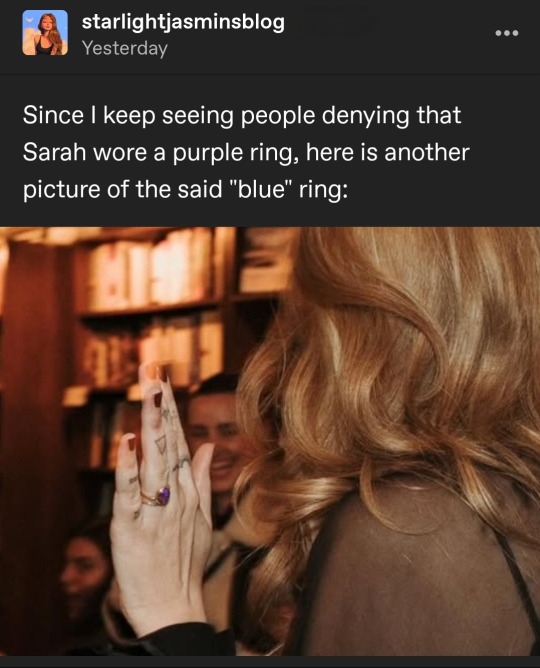
I know everyone's screens are different but you're honestly color blind if you think that ring could represent Az's Siphons. Clearly the journalist did not bother to do any actual research or care about authenticity before regurgitating the lies spread in the fandom.
Then:
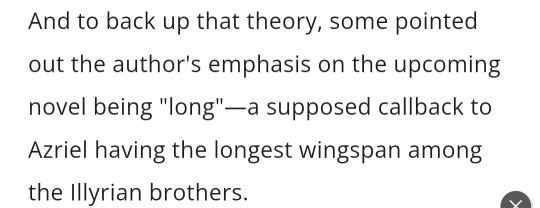
Azriel is actually not confirmed to have the longest wingspan. Not only is it clear Feyre was just teasing Rhys in ACOMAF but Sarah actually did an interview after ACOMAF where she would not confirm any of them as having the longest wingspan. Therefore using something that's not even true as proof that the next book being long is because of Az's wings rather than Sarah having a lot of plot to work with is scraping the bottom of the barrel. Once again the journalist and many e/riels refuse to bother with actual research.
I think people should feel embarrassed if they took that article as actual proof of something. Some say they're just having fun but having fun isn't shouting "confirmation" and simultaneously telling the other side that they keep winning while Elucien's / Gwynriels have nothing. Fun isn't sending harassing messages to the other side over that article.
If fake articles from a source completely unrelated to Sarah or Bloomsbury mean we have nothing then I guess yeah, we have nothing and we're glad of that. Because it's not something anyone should be gloating over.
#elain archeron#anti e/riel#azriel shadowsinger#sarah j mass#She's probably laughing at people believing this crap
65 notes
·
View notes
Text
Nocnitsa, the night hag [Slavic mythology]:
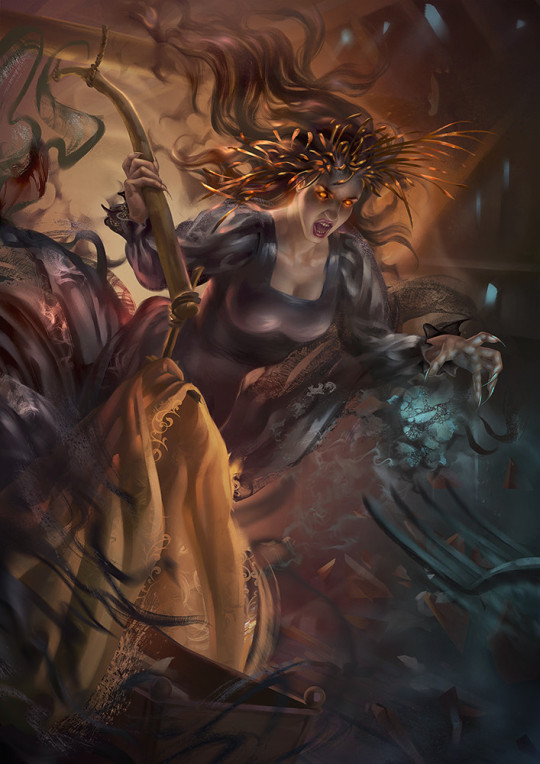
Nocnitsa is a hag or witch from Slavic folklore who inhabits woods and forests. She is heavily associated with night and darkness, and as such, she mainly targets sleeping children at night. A deeply evil creature, Nocnitsa usually bestows nightmares onto her victims, but she other ways of inflicting suffering: sometimes she shows up at night to breastfeed infants, but her milk is highly poisonous and will cause the child to fall ill.
In this aspect, she is associated with the Rusalka, another supernatural female monster that kills with her breasts. Sometimes, the breasts of a Rusalka were said to be made of iron or stone, and she would crush her victims to death with them.
To appease Nocnitsa, people would make offerings of bread (sometimes also salt), which would then be rubbed on the child. There are also certain charms or rituals to ward off the witch and cure a child’s insomnia. Alternatively, young children could be protected against Nocnitsa with a protective circle or by simply placing a knife under the cradle.
She is also called Nochnitsy (or a variation), Kriksy (meaning “scream”) and Plaksy (“the sniveler”, “one who snivels”), sometimes combined into the name ‘Kriksa-Plaksa’. In Belarus, Nochnitsy were a group of tiny spirits instead of a witch, but the principle remained the same. The Nochnitsy caused children to sleep badly, but they were deeply afraid of fire. To cure an infant cursed by the Nochnitsy, parents would make them sleep in front of the fireplace, or sometimes put onto a large tray or shovel and put in an oven for a short while (note: a smoldering warm oven, not a burning one. Please do not put babies in burning ovens).
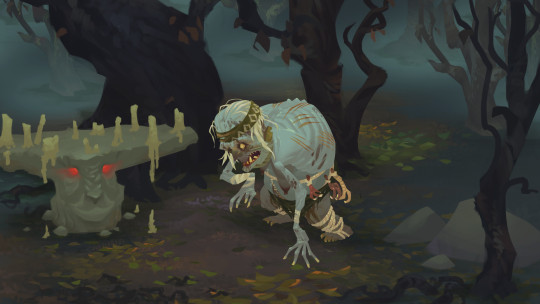
Interestingly, Nochnitsa (if it is indeed the same character) plays a minor role in the Slavic story of Pizamar, a mortal woman who fell in love with the god Svarozhich. Unfortunately, the gods forbade love between mortals and deities, so Pizamar tried to take her own life. She walked towards a cliff at night, but right before she could jump off, Nochnitsa cast a sleep spell on her.
Every time she tried to commit suicide, Nochnitsa put her to sleep. Lada and Chors, two goddesses, watched this scenario unfold several times before taking pity on Pizamar. They stole divine mead of immortality from the other gods and gave it to her, turning her immortal. Pizamar then became the entertainer of the gods, dancing and singing for them, which she did with such passion and talent that she eventually became the goddess of the arts.
Sources: Rose, C., 1996, Spirits, Fairies, Gnomes and Goblins: An Encyclopedia of the Little People, Bloomsbury Academic, 370 pp., p. 130, p. 186. Bane, T., 2013, Encyclopedia of Fairies in World Folklore and Mythology, McFarland, 428 pp., p. 277. Kliauz, V., 2001, Video-Recording Ritual Incantations and Folk Cures (1), Institute of World Literature, Moscow, SEEFA Journal, VI (2), 28-34. Bane, T., 2016, Encyclopedia of Beasts and Monsters in Myth, Legend and Folklore, McFarland, 428 pp., p. 241. Valodzina Tatyana, 2006, ‘Unchristened Flesh’: the Woman’s Breast and Breastfeeding in Traditional Slavic Culture, with Especial Reference to Belorussian, Forum for Antropology and Culture, No3, 168-192. Monaghan, P., 2014, Encyclopedia of Goddesses and Heroines, New World Library, 448 pp., p. 306. Min’ko, L. I., 1973, Magical Curing (Its Sources and Character and the Causes of its Prevalence, Soviet Anthropology and Archeology, 12:1, 3-33. (image source 1: Vasilyna Holod on Artstation) (image source 2: Alexandru Munteanu on Artstation)
#Slavic mythology#witches#mythical creatures#folklore#world mythology#mythology#sometimes I only use a few lines of information from a lot of sources#and then my bibliography is almost as long as the rest of the post
41 notes
·
View notes
Note
Sometimes I think engaging in any discussion about ships validates the existence of one that is in my opinion a completely fanon made up entity.
Imagine if we stopped acknowledging it altogether…
And to be honest, I think that is what SJM and Bloomsbury are doing. They gave information to big mainstream media companies to indicate the direction of the next book, and I’m sure there was a stipulation that said do not mention certain things.
Currently in the books one fanon ship does not exist. But in mainstream entertainment media and SJM social media account, it doesn’t exist either. It’s not even acknowledged in any format . That includes sjm interviews, that are only allowed to ask SJM certain questions. 
What would happen if it was not enough worthy of debate?
You have no idea how much I agree with you, anon. And I've attempted to do just that a few times. I've REALLY attempted to do it after HOFAS because so many things were so clear after it. That there is no GA, that the Cauldron WAS wrong, that women are more than just their wombs, and a dozen other things.
But fandom is a live thing and unfortunately, the ebbs and flows of it don't allow for the death of GA. People see the discourse, they see the fan arts, they get confused, they ask questions.
The default should be--you read the book, you are sure of what you've read. You go online and you see GA stuff. Your initial reaction was the RIGHT ONE. If you are confused by GA, you should be. You read the books correctly. Alas, others are so belligerent and so loud that you need to go and seek validation to your own sanity, and then the thing starts all over again.
It sucks.
Until we get some kind of an announcement, it wont go away.
31 notes
·
View notes
Photo

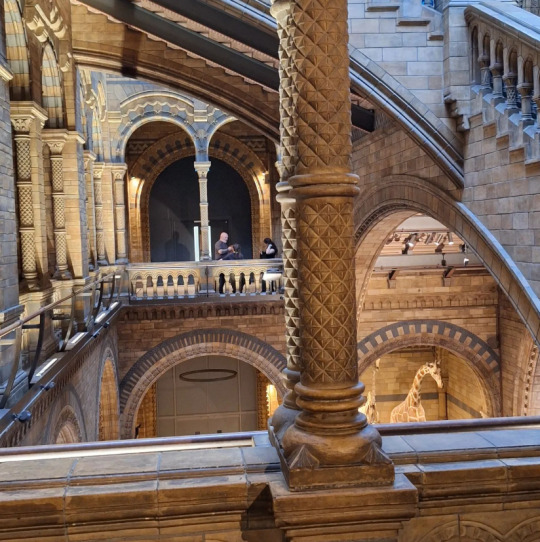

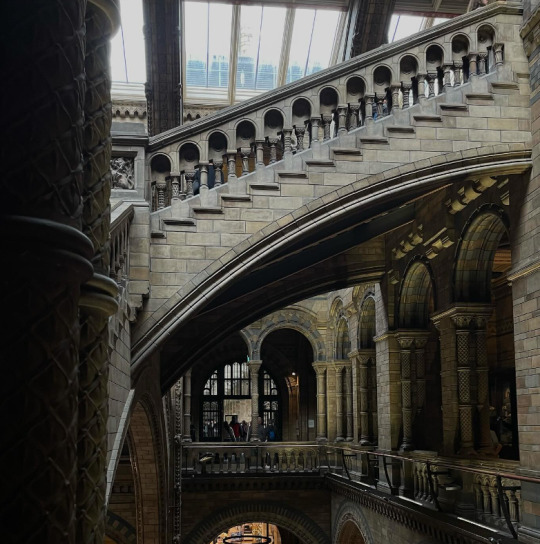
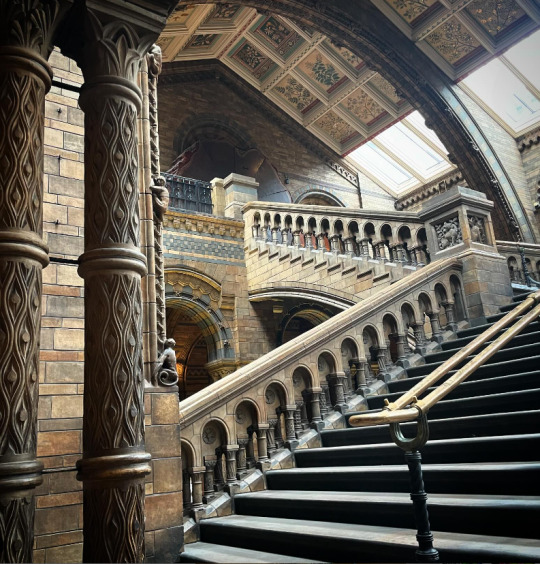


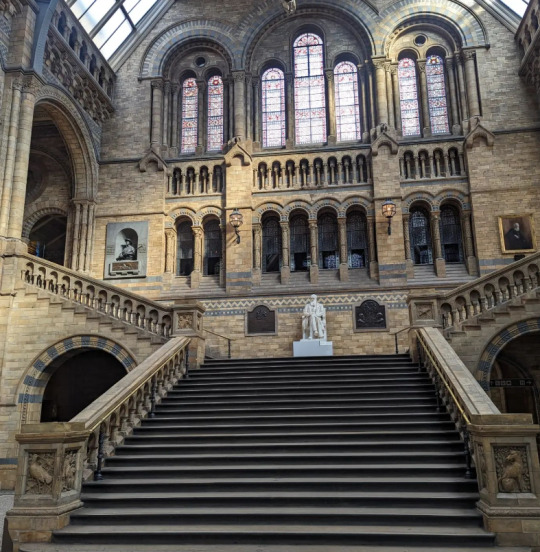

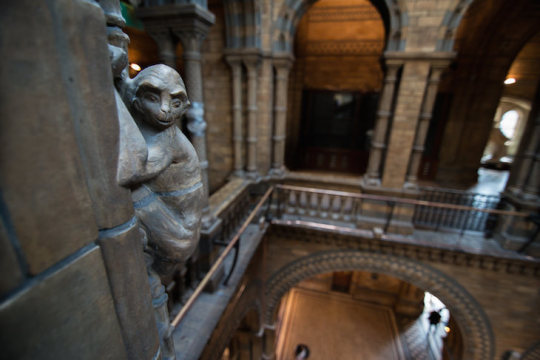

Natural History Museum - London
The Museum first opened its doors on 18 April 1881, but its origins stretch back to 1753 and the career of Sir Hans Sloane, a doctor and collector. Sloane travelled the world as a high society physician. He collected natural history specimens and cultural artefacts along the way. After his death in 1753, Parliament bought his extensive collection of more than 71,000 items, and then built the British Museum so these items could be displayed to the public. In 1856 Sir Richard Owen - the natural scientist who came up with the name for dinosaurs - left his role as curator of the Hunterian Museum and took charge of the British Museum’s natural history collection. Unhappy with the lack of space for its ever-growing collection of natural history specimens, Owen convinced the British Museum's board of trustees that a separate building was needed to house these national treasures. He drew-up a rough architectural plan in 1859 entitled 'Idea of a Museum of Natural History'. The plan was later referred to by architect Alfred Waterhouse in the design of the Natural History Museum. In 1864 Francis Fowke, the architect who designed the Royal Albert Hall and parts of the Victoria and Albert Museum, won a competition to design the Natural History Museum. However, when he unexpectedly died a year later, the relatively unknown Alfred Waterhouse - a Quaker architect from the north of England - took over and came up with a new plan for the Museum. Waterhouse used terracotta for the entire building as this material was more resistant to Victorian London's harsh climate. Construction began in 1873, and the result is one of Britain’s most striking examples of Romanesque architecture — considered a work of art in its own right and has become one of London's most iconic landmarks. Owen's foresight has allowed the Museum to display very large creatures such as whales, elephants and dinosaurs, including the beloved Diplodocus cast that was on display at the Museum for 100 years. He also demanded that the Museum be decorated with ornaments inspired by natural history. And he insisted that the specimens of extinct and living species kept apart at a time when Charles Darwin’s theory of evolution was revealing the links between them. Along with incorporating Owen’s ideas into his plans, Waterhouse also designed an incredible series of animal and plant ornaments, statues and relief carvings throughout the entire building – with extinct species in the east wing and living species in the west. Waterhouse sketched every one of these sculptures in great detail, even asking Museum professors to check the scientific accuracy of his drawings, before creating the fantastic decorations that complement the Museum’s exhibitions. While the building reflects Waterhouse’s characteristic architectural style, it is also a monument to Owen’s vision of what a museum should be. In the mid-nineteenth century, museums were expensive places visited only by the wealthy few, but Owen insisted the Natural History Museum should be free and be accessible to all. The Museum took nearly eight years to build, and moving the collections from the British Museum in Bloomsbury was a huge job. Relocating the zoological specimens, which included huge whale bones and taxidermy mammals, took 394 trips by horse and cart spread over 97 days. The Natural History Museum finally opened in 1881. The building’s decorative and Romanesque style by Waterhouse is reminiscent of medieval European abbeys, but it is also a monument to Owen’s vision of what a museum should be: the world’s largest and finest institution dedicated to natural history.

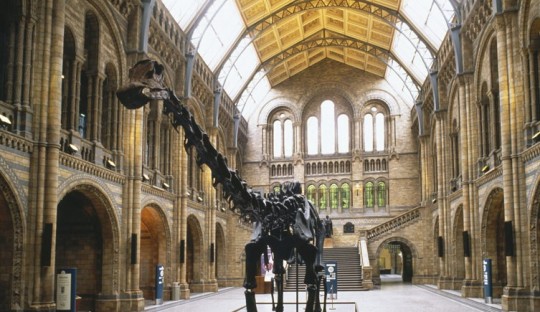
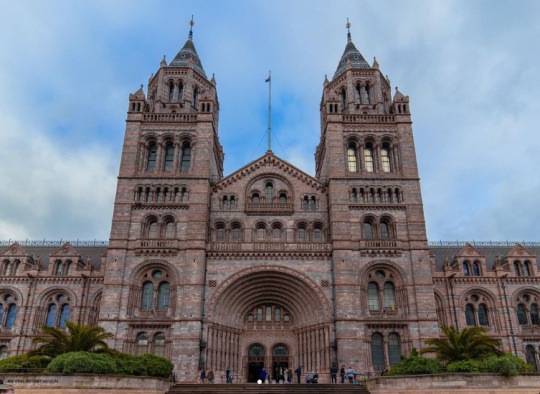

https://www.nhm.ac.uk/about-us/history-and-architecture.html
https://www.nhm.ac.uk/visit/virtual-museum.html
#other's artwork#architecture#Romanesque#Alfred Waterhouse#Sir Richard Owen#terra cotta#Natural History
71 notes
·
View notes
Text
Just in case. Some might enjoy. Had to organize some notes.
These are just some of the newer texts that had been promoted in the past few years at the online home of the American Association of Geographers. [At: aag dot org/new-books-for-geographers/]
Tried to narrow down selections to focus on (1) Indigenous, Black, Latin American, oceanic/archipelagic geographies; (2) imaginaries and environmental perception; (3) and mobility, borders, carceral/abolition geography.
These texts feature concepts/subjects like: Indigeneity and "geographies of time" in the Ecuadorian Andes. "Migration and music in the construction of precolonial AfroAsia." The "practice of collective escape" and "reimagining geographies of order." The "making and unmaking of French India." The "literary geography" of the rubber boom in Amazonia. "Coercive geographies" and mass imprisonment. "Anti-fatness as anti-Blackness." The "(un)governable city" of colonial Delhi.
---
New stuff, early 2024:
A Caribbean Poetics of Spirit (Hannah Regis, University of the West Indies Press, 2024)
Constructing Worlds Otherwise: Societies in Movement and Anticolonial Paths in Latin America (Raúl Zibechi and translator George Ygarza Quispe, AK Press, 2024)
Fluid Geographies: Water, Science, and Settler Colonialism in New Mexico (K. Maria D. Lane, University of Chicago Press, 2024)
Hydrofeminist Thinking With Oceans: Political and Scholarly Possibilities (Tarara Shefer, Vivienne Bozalek, and Nike Romano, Routledge, 2024)
Making the Literary-Geographical World of Sherlock Holmes: The Game Is Afoot (David McLaughlin, University of Chicago Press, 2025)
Mapping Middle-earth: Environmental and Political Narratives in J. R. R. Tolkien’s Cartographies (Anahit Behrooz, Bloomsbury Publishing, 2024)
Midlife Geographies: Changing Lifecourses across Generations, Spaces and Time (Aija Lulle, Bristol University Press, 2024)
Society Despite the State: Reimagining Geographies of Order (Anthony Ince and Geronimo Barrera de la Torre, Pluto Press, 2024)
---
New stuff, 2023:
The Black Geographic: Praxis, Resistance, Futurity (Camilla Hawthorne and Jovan Scott Lewis, Duke University Press, 2023)
Activist Feminist Geographies (Edited by Kate Boyer, Latoya Eaves and Jennifer Fluri, Bristol University Press, 2023)
The Silences of Dispossession: Agrarian Change and Indigenous Politics in Argentina (Mercedes Biocca, Pluto Press, 2023)
The Sovereign Trickster: Death and Laughter in the Age of Dueterte (Vicente L. Rafael, Duke University Press, 2022)
Ottoman Passports: Security and Geographic Mobility, 1876-1908 (İlkay Yılmaz, Syracuse University Press, 2023)
The Practice of Collective Escape (Helen Traill, Bristol University Press, 2023)
Maps of Sorrow: Migration and Music in the Construction of Precolonial AfroAsia (Sumangala Damodaran and Ari Sitas, Columbia University Press, 2023)
---
New stuff, late 2022:
B.H. Roberts, Moral Geography, and the Making of a Modern Racist (Clyde R. Forsberg, Jr.and Phillip Gordon Mackintosh, Cambridge Scholars Publishing, 2022)
Environing Empire: Nature, Infrastructure and the Making of German Southwest Africa (Martin Kalb, Berghahn Books, 2022)
Sentient Ecologies: Xenophobic Imaginaries of Landscape (Edited by Alexandra Coțofană and Hikmet Kuran, Berghahn Books 2022)
Colonial Geography: Race and Space in German East Africa, 1884–1905 (Matthew Unangst, University of Toronto Press, 2022)
The Geographies of African American Short Fiction (Kenton Rambsy, University of Mississippi Press, 2022)
Knowing Manchuria: Environments, the Senses, and Natural Knowledge on an Asian Borderland (Ruth Rogaski, University of Chicago Press, 2022)
Punishing Places: The Geography of Mass Imprisonment (Jessica T. Simes, University of California Press, 2021)
---
New stuff, early 2022:
Belly of the Beast: The Politics of Anti-fatness as Anti-Blackness (Da’Shaun Harrison, 2021)
Coercive Geographies: Historicizing Mobility, Labor and Confinement (Edited by Johan Heinsen, Martin Bak Jørgensen, and Martin Ottovay Jørgensen, Haymarket Books, 2021)
Confederate Exodus: Social and Environmental Forces in the Migration of U.S. Southerners to Brazil (Alan Marcus, University of Nebraska Press, 2021)
Decolonial Feminisms, Power and Place (Palgrave, 2021)
Krakow: An Ecobiography (Edited by Adam Izdebski & Rafał Szmytka, University of Pittsburgh Press, 2021)
Open Hand, Closed Fist: Practices of Undocumented Organizing in a Hostile State (Kathryn Abrams, University of California Press, 2022)
Unsettling Utopia: The Making and Unmaking of French India (Jessica Namakkal, 2021)
---
New stuff, 2020 and 2021:
Mapping the Amazon: Literary Geography after the Rubber Boom (Amanda Smith, Liverpool University Press, 2021)
Geopolitics, Culture, and the Scientific Imaginary in Latin America (Edited by María del Pilar Blanco and Joanna Page, 2020)
Reconstructing public housing: Liverpool’s hidden history of collective alternatives (Matt Thompson, University of Liverpool Press, 2020)
The (Un)governable City: Productive Failure in the Making of Colonial Delhi, 1858–1911 (Raghav Kishore, 2020)
Multispecies Households in the Saian Mountains: Ecology at the Russia-Mongolia Border (Edited by Alex Oehler and Anna Varfolomeeva, 2020)
Urban Mountain Beings: History, Indigeneity, and Geographies of Time in Quito, Ecuador (Kathleen S. Fine-Dare, 2019)
City of Refuge: Slavery and Petit Marronage in the Great Dismal Swamp, 1763-1856 (Marcus P. Nevius, University of Georgia Press, 2020)
#abolition#ecology#multispecies#landscape#tidalectics#indigenous#ecologies#archipelagic thinking#opacity and fugitivity#geographic imaginaries#caribbean#carceral geography#intimacies of four continents#reading list#reading recommendations#book recommendations#my writing i guess#indigenous pedagogies#black methodologies
72 notes
·
View notes